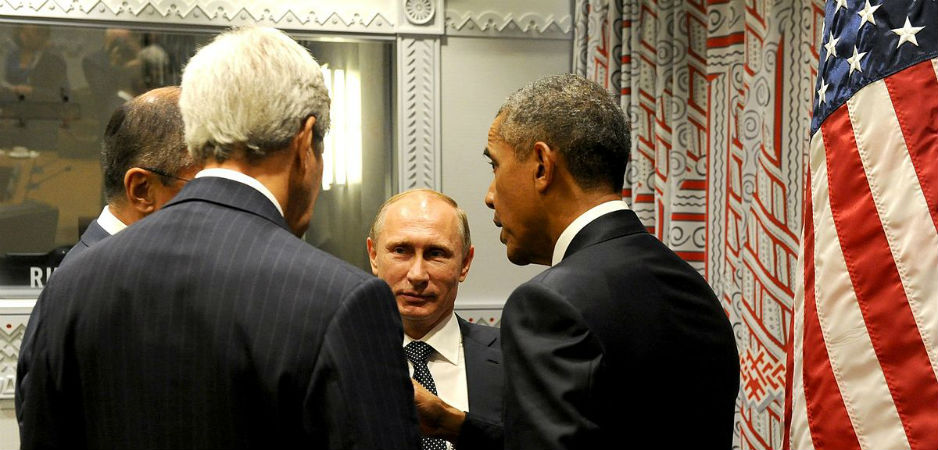Since Russia’s military intervention in Syria, it has become clear that US foreign policy in the Middle East will not survive in its current form.
Over one month into the Russian military campaign in Syria and it has become clear that US foreign policy in the Middle East is losing serious ground—possibly heading for a state of collapse. Not only has the terminal regime of Syrian President Bashar al-Assad been thrown a critical lifeline due to Russian airstrikes, but a realignment of interests in the war against the Islamic State (IS) is now starting to favor Moscow’s involvement in Iraq. All the while, regional events are moving at breakneck speed and outpacing the strategic, dare I say, judicious capabilities of our politicians to shape them into effective foreign policy.
None of this bodes well for the long-term interests of the United States, and we haven’t even got to the worst part yet.
Since commencing airstrikes on September 30, Russia has played its hand pretty brazenly—not so much targeting IS, but groups such as Jabhat al-Nusra, Ahrar al-Sham and other rebel factions (some of which have links to the CIA) that are putting direct pressure on Syrian regime strongholds. And due to this intervention, Iran has become emboldened and deployed up to 2,000 troops to assist the Syrian army in their assault on the rebel-held city of Aleppo.
From an American strategic perspective, this spells foreign policy disaster on a potentially biblical scale. Here’s why:
Should the Syrian army manage to retake Aleppo with support from Russian airstrikes and Iranian ground forces, President Assad will attempt to consolidate his control over cities to the west of Syria, including the individual rebel statelets forming on the periphery of the Alawi coast. However, in doing so, Assad will remove the last fragment of rebel opposition to IS, which will potentially secede a far greater portion of the east to its control. All of which drastically undermines US President Barack Obama’s strategy to ultimately “degrade and defeat” IS, regardless of the announcement on October 30 that a paltry 50 Special Forces will be deployed to Syria.
And just to add further insult to injury, all of these events were preceded by the implementation of a joint intelligence sharing agreement at the end of September, which has brought together Iraq, Iran and Syria under a new axis of cooperation that is being spearheaded by Russia, based out of the Ministry of Defense in Baghdad.
When all of this is added up, the US position in the Middle East is starting to look pretty untenable—isolated even.
Strategic and Tactical Missteps
Some of this is the resounding failure to articulate a regional strategy—not just to the American people, but more importantly to Iraqis and Syrians themselves, which could have potentially generated an indigenous coalition that might have aligned with US regional interests. While the US policy is to “degrade and defeat” IS, in reality it only provides the basis for containment; it is not a formula for any kind of sustainable victory.
And after one year of military operations against the Islamic State, known as Operation Inherent Resolve, the US has not been able to strike a mortal blow against the self-proclaimed caliphate. Daily airstrikes have been conducted, but there has been little in the way of actual ground support, which is an absolute necessity to defeat an enemy as cunning as IS. The lack of success surrounding the campaign is fueling a perception that the US has now become part of the problem, which has given Russia space to advance its own interests at the expense of Washington’s.
(Please allow me the luxury to interject here: Only the US could conjure up such a disabused name for a campaign it can never actually win. “Inherent Resolve” probably says more about the insufferable politics surrounding the war with the Islamic State than the actual conflict itself.)
Even in Iraq, where US support should be relatively stable given over a decade of nation-building, leading politicians are now calling for deeper Russian involvement.
In a statement released on October 11, Iraqi Member of Parliament (MP) Aliya Nassif said: “American betrayed us over the past 12 years.” The statement finished with: “The political forces today must assume national and historical responsibility as we must invest the historic opportunity for the Iraqi people in letting Russia direct strikes against ISIS [Islamic State].” This was followed by an acknowledgement on October 14 from Iraqi MP Hakim al-Zamili, head of the powerful parliamentary defense committee, that Russian intelligence has been used by Iraqi security forces to target IS commanders.
When all of this is added up, the US position in the Middle East is starting to look pretty untenable—isolated even.
At present, official sources from US CENTCOM have indicated that no such appeal from the Iraqi government has been issued to the Russians. But unofficial security sources inside Iraq have suggested that the request is not far off.
Unnatural Trajectories
This loss of influence calls attention to a more nuanced view of the preconditions that the US has set for its involvement in the fight against the Islamic State and Assad. These terms are entirely unnatural to the trajectory of either conflict and are predicated on political agendas that are not so much about pragmatic strategy positions, but entrenched ideological positions that are pointless in a war against a non-state actor like IS.
In Iraq, this has meant denying support for operations that are led by Shia-backed popular mobilization units known as the Hashd al-Shaabi, which have links to Iran and have eclipsed the Iraqi army as the main fighting force against IS. And in Syria, this has meant arming rebels to fight IS, but making them sign a pledge not to fight the Assad regime. Yet for most opposition fighters in Syria, their main goal remains—and will always be—the removal of Assad, not the defeat of the Islamic State.
This has led to a bipolar foreign policy that exists in a state of semi-permanent contradiction, which has eroded confidence in the type of assistance the US is willing to offer. Nowhere was this more apparent than in the calamitous $500 million program to arm Syrian rebels to fight IS—a signature foreign policy piece of the Obama administration that was abandoned on October 9 due to its inability to actually find, train and arm any moderate Syrian rebels.
In fact, external military pressure from Russia probably helped bring about the decision to scrap the initiative, which goes to show just how lukewarm the initial program was to begin with, making it more about political optics in the US and less about strategy or tactics in the conflict against IS. Not only was the program deeply unrealistic given the battlefield experience of IS—honed over the past 12 years—but it was the expectation that the US could develop objectives that might superseded those of the Syrian opposition, which displayed the most remarkable lack of foresight.
Russian Realpolitik
For their part, the Russians have no such squabbles—not about political optics, not about battlefield casualties and not about what their long-term strategy should be. Their interest in building a coalition to support the internationally isolated regime of Bashar al-Assad has only highlighted the extent to which they will go to protect their own foreign policy interests—something the US has neither the will nor capacity to do. And in this respect, US foreign policy is unlikely to survive in its current form.
The proverbial silver lining and the one thing that might inadvertently save the US from its own foreign policy black hole is that Russian support for one of the most despised regimes in the world—with a coalition of minority Shia states—does not provide the basis for sound long-term foreign policy. Not when the majority of Sunni states in the Middle East have an interest in seeing the Islamic State defeated and Assad removed from power.
Nonetheless, in the short-term, the US will have to demonstrate that it is still an effective player in the Middle East. This will require more than a token ground force deployment in Syria—50 Special Forces versus 2,000 Iranian soldiers is hardly a good showing—or the occasional airdrop to resupply anti-IS forces in Syria, especially when Russia is committing vast military resources. Although, in recent weeks, the US has accelerated airstrikes against IS in the contested Iraqi city of Baiji and in the restive Anbar Province, in an attempt to offset the specter of Russian influence in Baghdad.
Will this be enough for the US to regain the advantage in the Middle East?
Only time will tell. But with the forthcoming foreign policy discussion, which will dominate parts of the 2016 US presidential election debates, along with Obama’s obvious desire to maintain the status quo for his successor, it is safe to say the US is not setting the conditions for long-term foreign policy success. However, maybe this has been part of the plan all along.
The views expressed in this article are the author’s own and do not necessarily reflect Fair Observer’s editorial policy.
Photo Credit: Kremlin.ru / Pete Souza
 We bring you perspectives from around the world. Help us to inform and educate. Your donation is tax-deductible. Join over 400 people to become a donor or you could choose to be a sponsor.
We bring you perspectives from around the world. Help us to inform and educate. Your donation is tax-deductible. Join over 400 people to become a donor or you could choose to be a sponsor.
Support Fair Observer
We rely on your support for our independence, diversity and quality.
For more than 10 years, Fair Observer has been free, fair and independent. No billionaire owns us, no advertisers control us. We are a reader-supported nonprofit. Unlike many other publications, we keep our content free for readers regardless of where they live or whether they can afford to pay. We have no paywalls and no ads.
In the post-truth era of fake news, echo chambers and filter bubbles, we publish a plurality of perspectives from around the world. Anyone can publish with us, but everyone goes through a rigorous editorial process. So, you get fact-checked, well-reasoned content instead of noise.
We publish 2,500+ voices from 90+ countries. We also conduct education and training programs
on subjects ranging from digital media and journalism to writing and critical thinking. This
doesn’t come cheap. Servers, editors, trainers and web developers cost
money.
Please consider supporting us on a regular basis as a recurring donor or a
sustaining member.
Will you support FO’s journalism?
We rely on your support for our independence, diversity and quality.







